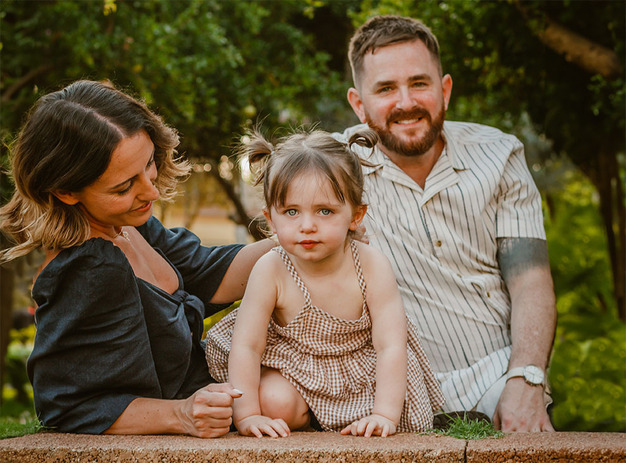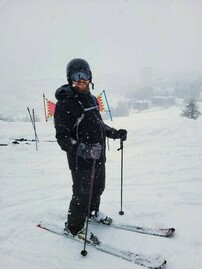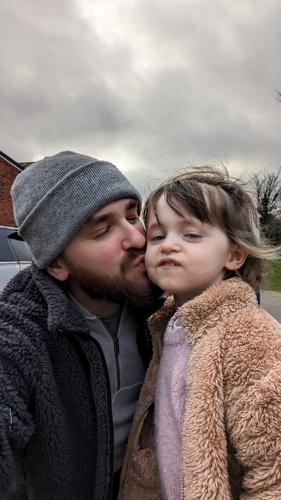Life after brain injury

22nd August 2011 is a date etched into my brain. I was a 27-year-old electrical engineer at the time when a bad fall from a height of 40ft would change the course of my life.
As well as suffering a traumatic brain injury, I also sustained fractured cheekbones, multiple cracked ribs, a broken hand and fractured coccyx. The fall had also punctured one of my lungs.
Emergency doctors put me into an induced coma and drilled a tap into my skull to relieve the swelling on my brain. My parents and girlfriend were told that - if I survived - I would be in an in-patient facility for at least two years. As I lay unconscious for several weeks, they began planning the adaptations they might need to make at home to suit 'a new me'.
When I finally did wake up, I’d lost the ability to walk, read and talk. I didn’t recognise my girlfriend of four years and what I could remember was limited to me as a 16-year-old.
There were many stages to my recovery in hospital. I was put under 24-hour care as I couldn’t walk but would constantly try to get out of bed. I had lost the ability to acknowledge when I needed the toilet, and I couldn’t wash or feed myself. There was a period where I was awake but not really there, seeing things that didn’t exist.
'I learnt to walk again'
When I could talk again, I had aphasia for a period. I spoke in accents, was loud, made random jokes, and was a completely different person to the one I had been - something that’s apparently common for people who have had a blow to the left side of their head.
Gradually, things started to come back to me, my memory started to come back, I woke from the dreamlike state I’d been in and, with intense rehab, learnt to walk again.
I stayed for a brief period in a live-in facility, then my girlfriend Hayley left her job to become my full-time carer and I was able to come home. Although it felt like a lifetime, I had been in hospital for little over 17 weeks before returning home to start cognitive rehabilitation.
Upon release, the doctor signing me out said I was a 'miracle'. They had not seen a lot of people recover at this rate, if at all, from a head injury of this scale. I count my lucky stars for only being a patient for such a short time, but it's been my recovery and time since the accident that I'd say was more miraculous.
Life after hospital
I had a year off in total for rehab but, just as I was about to return to work, I was made redundant. I’d already been told that many people who had suffered a brain injury of my scale would often not be able to go back to their jobs, would struggle with day-to-day tasks and would need to come to terms with a life and future that looked very different.
But during that time, I’d worked hard to prove the doctors wrong. They said I would struggle physically, so I threw myself into everything I could; cycling everywhere and training for intense physical events like Tough Mudder. I struggled with the left side of my body being weaker, but wouldn’t let this stop me.
 When it came to accepting what work life had in store for me, I found things difficult to comprehend and couldn’t accept a different me. Getting a job wasn’t the hard part - keeping the role while my brain was still recovering was.
When it came to accepting what work life had in store for me, I found things difficult to comprehend and couldn’t accept a different me. Getting a job wasn’t the hard part - keeping the role while my brain was still recovering was.
I was let go from three different roles within a year, leaning on old contacts before landing a job I was able to hold down.
Still refusing to accept what was said about brain injury survivors, in 2013 I decided to study part-time for a Quantity Surveying degree, completing with a 2:1 in 2016.
The highlight for me was holding down employment and gaining sponsoring for the university fees, along with a first-class honour for my dissertation.
Becoming MRICS
I have always been quite anxious about my ‘condition’ and the unknowns that life can hold. I haven’t let any employers know about my past as I have never wanted to be judged or treated any differently. Even when I was let go from roles, rightly or wrongly I refused to share what I had been through. Due to the difficulties I’d faced, I was surprised after my degree studies when a director at work put me forward to become a chartered member of the RICS.
With the assistance of class mates and lecturers I had found university fairly manageable. However, a two-year structured MRICS programme, preparing to present a case study to a group of FRICS who had 150 years’ collective experience was something else!
In 2019, I achieved professional membership status. Although I have faced many challenges over the past 12 years, studying and passing my chartership on the first attempt has been one of my greatest accomplishments to date! I had a lot of assistance from a number of MRICS/ FRICS members and will be eternally grateful.
The ups and downs of life after brain injury
During all of this I married the lady that stood by me through these dark times, and the reason why I have pushed through boundaries I honestly didn't think were possible to get through. There have been new challenges throughout the past 12 years and new phases to overcome.
I have struggled with anger and keeping it under control. I lost my ‘filter’ for a while and said things exactly how I saw them. Change hits me hard: finishing intense studies, moving house, Covid, lockdown, and having a daughter. I have to navigate each challenge as it comes up.
Luckily, I have my wife Hayley and now my daughter, Penelope, to give me another reason for pushing through boundaries. 
I don't know how or when or if I've ever recovered from my brain injury. I eat well, I exercise regularly to keep my mind active and keep a routine, and I meditate to clear the noise when it gets too much.
I've just finished a four-month CBT therapy course. It has helped massively to talk to a professional about the ups and downs I’ve been through.
It might sound strange but I am thankful every day for the accident, if I think about it. It made me a better person, I know what I can overcome. I know who’s important to me and I know how precious life is - I count myself as one of the lucky ones.
If my story can help just one person or inspire people in any way, that would mean the world to me and it’s one of the reasons I am now volunteering as an ambassador with LionHeart, championing health and mental health within our profession. The support that LionHeart can offer to surveyors is a real game changer and I hope to give people the courage to seek that support when they need it.
Scott Pearshouse MRICS is a former electrical engineer turned M&E senior quantity surveyor, based in the West Midlands. He is a mental health ambassador for LionHeart.

